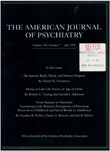Personality differences between patients with remitted melancholic and nonmelancholic depression
Abstract
Seventy-five patients with remitted depression were categorized as having melancholic-endogenous or non-melancholic-nonendogenous depression according to DSM-III criteria, Research Diagnostic Criteria, and the Newcastle endogeneity scale. The patients' scores on four personality scales--the Eysenck Personality Inventory, the Interpersonal Dependency Inventory, locus of control, and the Interpersonal Sensitivity Measure--were then compared. Patients with nonmelancholic-nonendogenous depression were generally rated as having more vulnerable personality styles, but the differences were dependent on the particular diagnostic system used. A principal components analysis isolated three underlying personality constructs--dependency, introversion, and timidity. Patients with nonmelancholic-nonendogenous depression scored as significantly more dependent.
Access content
To read the fulltext, please use one of the options below to sign in or purchase access.- Personal login
- Institutional Login
- Sign in via OpenAthens
- Register for access
-
Please login/register if you wish to pair your device and check access availability.
Not a subscriber?
PsychiatryOnline subscription options offer access to the DSM-5 library, books, journals, CME, and patient resources. This all-in-one virtual library provides psychiatrists and mental health professionals with key resources for diagnosis, treatment, research, and professional development.
Need more help? PsychiatryOnline Customer Service may be reached by emailing [email protected] or by calling 800-368-5777 (in the U.S.) or 703-907-7322 (outside the U.S.).



